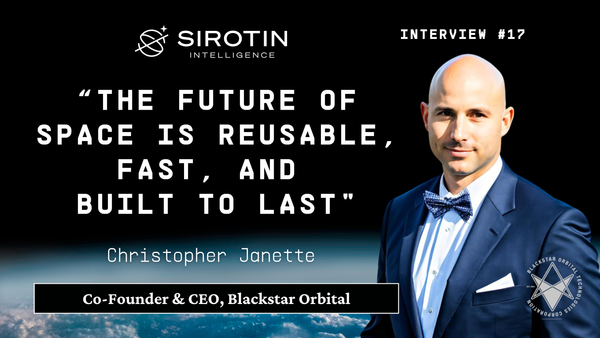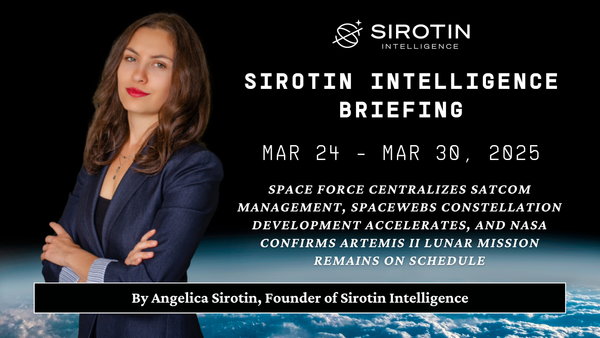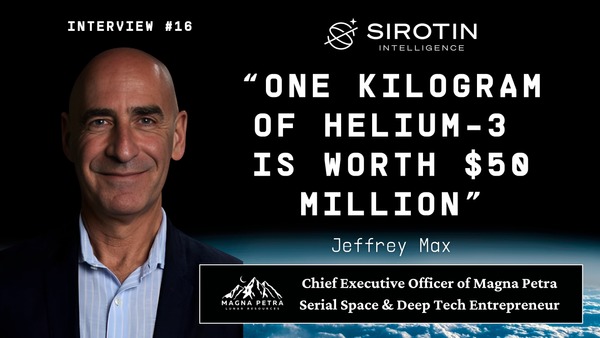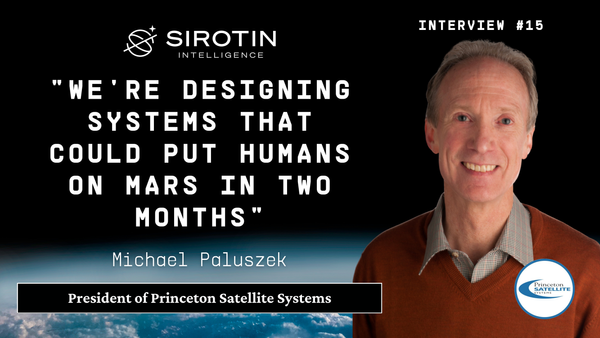"We're Treating Satellites Like They're Still In The 1990s": Delta-V Analytics Co-Founder Niha Agarwalla's Mission To Create The Operating System For Space, Powered By AI
Niha Agarwalla, co-founder of Delta-V Analytics, is creating AI-powered digital twins for satellites that predict failures before they happen, transforming space industry maintenance from reactive to proactive.
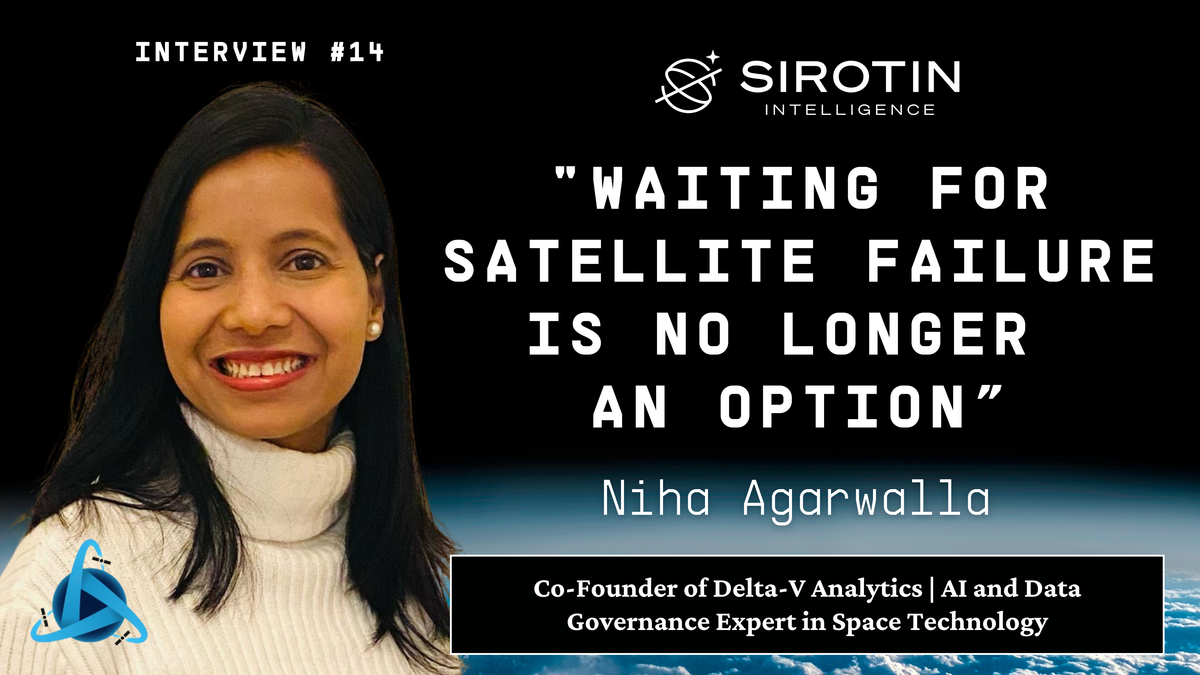
In a sleek United States office overlooking the city's technological hub, Niha Agarwalla is quietly solving one of the space industry's most expensive problems. While billionaires race to launch more rockets and satellites, this former Microsoft and pharmaceutical industry data expert recognized what everyone else missed: the $420 billion space industry is still operating with analog-era maintenance systems in a digital world.
As Co-founder of Delta-V Analytics, Agarwalla is pioneering AI-driven digital twins for satellites that can predict failures before they happen—potentially saving companies millions in lost revenue and preventing satellite deactivations that currently last up to a month. In an industry where hardware has always been king, she's proving that the next space revolution isn't about better rockets or bigger constellations—it's about transforming the mountains of satellite data into predictive intelligence that keeps critical space infrastructure operational.
What got you interested in space tech, and how did your experience in data analytics lead to founding Delta-V Analytics?
"Coming from an engineering background, I've always been drawn to solving complex problems, and space is one of the most challenging and exciting fields. The decision to found Delta-V Analytics was driven by two factors: a technical opportunity and entrepreneurial ambition. Growing up in a family of business owners, I always wanted to become an entrepreneur.
My co-founder, Mr. Naushad Rahman, has been in the space industry for decades, working with numerous space tech companies. In 2019, we collaborated on a competition organized by Airbus that involved space technology with AI or data analytics components. This initial academic research problem received positive feedback, and we subsequently won another competition in Thailand.
Through these experiences, we identified a significant industry gap. While the space industry is rapidly growing, it remains heavily hardware-focused, with satellite operations, development, and testing still largely manual processes. Computing hasn't been a core focus in the space domain. Traditional space systems are predominantly offline, extremely high-tech, or confined to specific computer environments, with limited cloud integration.
We recognized this as an opportunity because as any industry grows, software becomes essential to make processes more autonomous. Additionally, we observed that space tech was moving toward sustainability. Between 2013 and 2015, numerous private companies entered the space sector, primarily for academic or research purposes. By 2021-2022, the focus had shifted toward commercialization. Both sustainability and commercialization were needed, and we believed we were well-positioned to address these needs. This aligned with our value system and my experience in regulated industries. The opportunity arose because of my co-founder's space background combined with my business expertise—the stars aligned perfectly."
See Delta-V's explainer video to learn more about how AI-Powered Autonomy is transforming satellite testing and operations: AI-Powered Autonomy: The Future of Satellite Testing and Operations
What does Delta-V Analytics do, and how are you using AI and machine learning to solve space-related problems?
"Delta-V Analytics develops high-end computing software for space applications, primarily targeting satellite development, testing, and both pre-launch and post-launch operations. Our expertise focuses on AI and autonomy. Currently, operations in the satellite industry generally deal with highly fragmented data. Workflows are primarily expert-driven rather than data-driven, reflecting the industry's hardware-centric nature.
We create AI-powered digital twins for satellites. While simulations have been standard practice, they're primarily effective during the satellite design phase, not during testing. Drawing parallels from Industry 4.0 in manufacturing sectors like automotive and maritime, where digital twin technology has been widely adopted, we saw that space wasn't following this trend—which is precisely our focus area.
A key application is fault detection. Currently, most space tech industries, including major players, rely on threshold-based fault detection. To use a medical analogy, it's like only addressing high blood pressure when it reaches critical levels, despite it potentially resulting from underlying issues like obesity or high cholesterol. Similarly, companies typically take action only when satellite parameters cross critical thresholds, necessitating satellite deactivation. This has significant commercial implications, as when a satellite is deactivated, data transmission stops, service level agreements cannot be met, and satellites can remain inoperative for up to a month.
We questioned this reactive approach. It may have been adequate when sending individual satellites to geostationary orbit, but it's impractical for managing satellite constellations. Instead, we've implemented proactive approaches using AI-based fault detection systems that can preemptively identify potential issues before they become critical. This allows operators to perform maintenance without deactivating the satellite.
This applies to satellite testing as well. Satellite development typically involves creating two models: an engineering model and a flight model. Testing is conducted on the engineering model, as testing the flight model with procedures like vibration or thermal testing could damage expensive components. If components are damaged during testing, supply chain delays can extend to six months, not including reassembly time. With the proliferation of small satellites in Low Earth Orbit, reliability has decreased significantly.
To address these challenges, software systems for testing are essential—similar to those already employed in automotive and maritime industries. By drawing these parallels, we recognized that satellites are essentially robots, and if the robotics industry is advancing rapidly, we could apply similar technologies to space applications. This is where AI and machine learning capabilities become relevant, aligning perfectly with my expertise."
What are some of the trends you see coming up in the next few years in satellite data analytics and space-based services?
"When we initially deployed our software and consulted with industry experts, they viewed our approach as beneficial but not essential. However, perceptions have shifted, particularly in two key domains. First, autonomous operations have gained importance as managing large satellite constellations cannot feasibly rely on numerous ground operators. Autonomy is necessary, and this extends beyond basic command scheduling to include autonomous satellite recovery from issues and reduced downtime.
Second, space situational awareness has become increasingly vital due to the proliferation of satellites, debris, and space waste. The focus is on protecting valuable assets worth billions while ensuring available launch space.
A third significant trend is the evolution of satellite hardware. Previously, implementing software or AI solutions in satellites was challenging due to hardware limitations and the absence of smart or data-driven sensors. Now, hardware systems are producing substantial amounts of data, highlighting that while hardware remains essential, software has become equally critical.
These three trends are reshaping the space industry. I anticipate that within the next three years, we'll witness a significant increase in data science and machine learning applications in space technology. This shift is already evident across private, commercial, and government sectors worldwide, particularly in the United States, Europe, and Asia, with India showing substantial interest in this trend."
For a deeper dive into this evolution, check out Space Data Fusion for Unified Automated Operation System by Naushad Rahman and Niha Agarwalla, presented at AIAA 2024. This paper explores how Delta-V Analytics' Unified Automated Operation System (UAOS) integrates Digital Twin and AI technologies for real-time satellite health assessments. Read more here: AIAA 2024-4808.
With your experience in building data governance frameworks, what are the major challenges and opportunities in managing and using space-based data effectively?
"While data in the space industry is increasing daily, affordability remains a significant concern. Despite numerous satellites being deployed, Earth observation and hyperspectral data remain expensive, with quality often questionable. Those providing high-quality data frequently establish market monopolies. To enhance space data accessibility, we need improved data integrity frameworks, which are currently lacking but developing.
For space data governance, several factors are beneficial. Security is paramount as satellites generate increasing amounts of data. Cybersecurity must be taken seriously in space technology, particularly since these are often national projects that could pose national security risks if compromised. Encryption and role-based access controls are essential measures.
Collaboration presents another challenge. The space industry employs multiple domain experts, including astrophysicists, mathematicians, electrical engineers, and mechanical engineers. Without centralized data management and proper data integrity, effective collaboration becomes difficult. We're working toward establishing a single source of truth, which, while not entirely achievable, can at least enable functionalities that facilitate collaboration.
From an AI perspective, data readiness is crucial, making well-structured metadata essential. This is particularly important when implementing technologies like large language models.
There's also an ongoing significant project focused on hybrid space architecture, initiated by the US government to align government and private networks. The goal is to standardize protocols, combining government robustness with private industry innovation to enhance space data accessibility and utilization.
Interoperability represents both a challenge and an opportunity. While standardization poses challenges, the benefits for hybrid space architecture are substantial. Finally, responsibility must be integrated into data governance frameworks, particularly concerning responsible AI deployment. Even though we're dealing with technological assets rather than humans, biased systems can still create significant problems."
How does Delta-V Analytics differentiate itself from others in the market?
"While we're not the only software provider in the space sector, the number of software players is relatively small. The space software industry is generally divided into three segments: design, testing, and post-launch operations.
The design segment has numerous established players with simulation tools. However, testing tools are scarce, which is precisely our target market. There are also various management tools for project, hardware, and compliance management, but our focus differs. These management tools serve as inputs for our system, as we position ourselves as a pure engineering tool for testing and post-launch operations.
Specifically, we're not developing typical mission control software but rather predictive maintenance software. When applying these filters, Delta-V Analytics emerges as the only private-sector company offering predictive maintenance software for space technology, excluding space agencies themselves."
About Niha Agarwalla
Niha Agarwalla combines expertise in AI, computing, and data governance with a journey spanning regulated industries and cutting-edge technology. From leading data governance and AI initiatives in pharmaceuticals to driving operational optimization at Microsoft Xbox, she brings a unique cross-domain perspective to space technology.
At Delta-V Analytics, Niha applies her experience to develop AI-driven digital twins, real-time fault detection, and decision-support systems for satellites. Her background in regulated industries and tech innovation allows her to deliver scalable, efficient solutions tailored to the complex needs of satellite operations.
For more information, reach out to Niha at niha@deltavrobo.com


